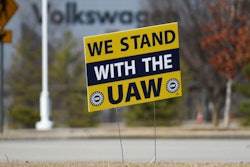OKLAHOMA CITY (AP) -- A federal judge blocked portions of Oklahoma's tough anti-illegal immigration law on Wednesday, saying it is ''substantially likely'' the law is unconstitutional.
U.S. District Judge Robin J. Cauthron issued a preliminary injunction prohibiting enforcement of provisions of the law that subject employers to penalties for failing to comply with a federal employee verification system.
The decision came on a lawsuit filed by the U.S. Chamber of Commerce, the Oklahoma Chamber and other business groups, who argued the electronic verification system is voluntary under federal law and employers should not be subjected to state penalties.
''Through harsh civil penalties, the Oklahoma law unfairly shifts the burden of immigration enforcement from government onto the backs of business,'' Robin Conrad, executive vice president of the U.S. Chamber, said in statement.
The state law took effect in November, but the employer provisions under attack were set to take effect July 1.
Among other things, employers could face civil lawsuits and tax penalties under the Oklahoma law.
Cauthron's ruling had no effect on other areas of the law, such as provisions that prohibit illegal immigrants from receiving tax-supported services and make it a state crime to transport or harbor an illegal immigrant.
Cauthron held that the business plaintiffs in the case before her would probably be able to establish that the state law pre-empted federal law dealing with immigration and verification of the status of employees.
The judge wrote that the court should give grave consideration to overturning state law, but that the Constitution ''requires that the will of the states must occasionally give way to the need for uniformity among the states and that uniformity can only be accomplished through congressional action.''
Cauthron said she was not deciding the case, but based on the facts she has seen ''it appears that plaintiffs are likely to prevail and consequently are entitled to a preliminary injunction.''
Attorney General Drew Edmondson is defending the law. ''We will attempt to overcome this hurdle when the matter is set for hearing on the permanent injunction,'' he said.
Rep. Randy Terrill, R-Moore, who introduced the legislation, said he was disappointed but not surprised by the ruling, which he called ''a blatant act of judicial activism.''
He predicted the case would be appealed to the U.S. 10th Circuit Court of Appeals and perhaps the U.S. Supreme Court if the plaintiffs prevail in their quest for a permanent injunction. No hearing date was set.






















